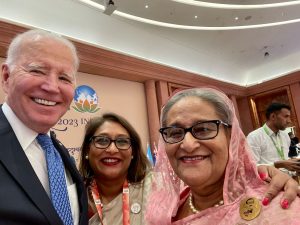Bangladesh is just a few months away from its next general election, but the ruling Awami League (AL) and the opposition parties are locked in a disagreement over the administration of the election. While the opposition Bangladesh Nationalist Party (BNP) wants elections under a non-partisan caretaker government, as they believe that elections under Prime Minister Sheikh Hasina will not be free and fair, the AL government is unlikely to concede their demand.
The stalemate is unlikely to be resolved anytime soon.
Elections should be an internal matter for any country. The upcoming Bangladesh election, however, has become an issue of interest and involvement for several international actors, with some governments weighing in on the stalemate in the country. While some of them are quietly engaging one side or the other, others are openly calling on the AL government to ensure a free and fair election.
The roles of India and the United States and their divergent positions on the AL government are important in this regard. Both countries are hugely influential in Bangladesh’s domestic affairs.
In the run-up to the 2014 general election, which was later boycotted by opposition parties, the then-U.S. ambassador in Bangladesh made several trips to New Delhi to persuade India to support a U.S. campaign for a free and fair election in Bangladesh. Instead, India persuaded the U.S. to support its position of backing Hasina.
During the 2018 Bangladesh general election, both India and the U.S. (then under the Trump administration) seemingly agreed to continue extending support to Hasina. Hasina’s narrative of counterterrorism and development resounded well with Washington’s counterterrorism agenda.
However, in a bid to check China and Russia, U.S. foreign policy under President Joe Biden has shifted focus to prioritizing human rights and democracy. This has emerged as a problem for Bangladesh. In December 2021, Washington imposed sanctions on Bangladesh’s elite paramilitary force, the Rapid Action Battalion, and six of its officials, for gross human rights violations. State-driven extrajudicial killings and enforced disappearances dropped significantly thereafter.
The Biden administration has also threatened a visa ban on Bangladeshis who act to deter the conduct of a free, fair, and inclusive election in Bangladesh. This is a direct challenge to Hasina’s plan.
India is perceived to be supporting Hasina. It sees the AL government as a strong bulwark against Islamist militancy in Bangladesh and in deterring insurgents from India’s Northeast from taking sanctuary in Bangladesh. Importantly, the AL government has approved four transit routes to India through Bangladesh, which will not only improve economic development in the land-locked Northeast but also boost India’s Look East policy.
Washington’s repeated calls for a free and fair election in Bangladesh have not gone down well in New Delhi.
“Many in India wrongly take this to mean that the United States favors the BNP over the Awami League. This is not true,” Daniel Markey, a senior adviser for South Asia at the United States Institute of Peace (USIP), told The Diplomat. He pointed out that Washington “would simply like to see Bangladesh achieve its potential as a democratic partner and fast-growing economy in the region.”
“India’s suspicions about American aims in Bangladesh have restricted closer U.S.-India cooperation in Bangladesh, although overall ties between Washington and New Delhi are warmer than ever before,” Markey said.
Indeed, India-U.S. relations have never been stronger. “It was quite clear from the G-20 summit in New Delhi that the U.S. wants to please Indian Prime Minister Narendra Modi and bent over to accommodate India by not insisting on Russia being mentioned in the final communique,” Arild Engelsen Ruud, a professor of South Asian Studies at the University of Oslo in Norway, told The Diplomat.
The G-20 summit at New Delhi is “a crucial indicator of how the U.S.-India relationship may evolve in the coming days,” he said.
According to Ruud, the U.S. is banking on Modi remaining in power after the 2024 general election in India and will need to be in his good books to counter Beijing.
Is it possible that the Biden administration will go along with the Indian position on the Bangladesh general election?
At the New Delhi G-20 summit, world leaders including Biden, Modi, and British Prime Minister Rishi Sunak were seen taking selfies and posing for photographs with Hasina.
Following that summit, two influential human rights advocates in Bangladesh, Adilur Rahman Khan and Nasiruddin Elan, were imprisoned for two years for a 2013 report documenting state-driven extrajudicial killings during a protest. The government described the report as “fake, distorted, and defamatory.”
Hasina is now in New York to participate in the 78th UN General Assembly and will attend a dinner hosted by Biden.
Meanwhile, the Hasina government has also given its assent to the development of the Mongla port with Chinese funding. Mongla port is near the Indian border. The decision signals Hasina’s rising confidence.While she has been close to India, she has hedged her bets by opening up to China too. India now finds itself in a bit of a geopolitical bind as it has seemingly thrown its support behind the AL, which is meanwhile courting China.
How the U.S.-India-Bangladesh relationship evolves from this point is hard to predict. But as elections draw near and the stalemate between the government and the opposition is showing no sign of easing, the crisis in Bangladesh is likely to prolong.

































